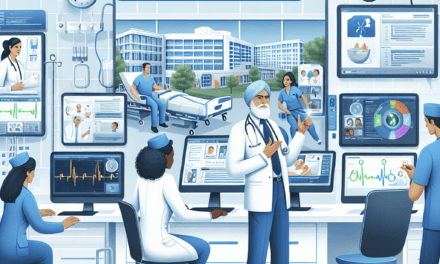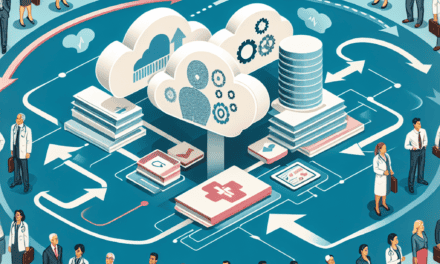St. Luke’s Nurses Achieve Success Through Enhanced Clinical Education System

In the ever-evolving landscape of healthcare, the role of nurses is pivotal. At St. Luke’s Hospital, a renowned institution known for its commitment to excellence, nurses are achieving unprecedented success through an enhanced clinical education system. This article delves into the multifaceted approach that St. Luke’s has adopted to empower its nursing staff, ensuring they are equipped with the skills and knowledge necessary to provide top-tier patient care. Through a combination of innovative training programs, cutting-edge technology, and a supportive learning environment, St. Luke’s is setting a new standard in nursing education.
1. The Foundation of Excellence: St. Luke’s Commitment to Nursing Education
St. Luke’s Hospital has long been recognized for its dedication to healthcare excellence. Central to this mission is the belief that well-educated nurses are the backbone of quality patient care. The hospital’s commitment to nursing education is evident in its comprehensive approach to training and development.
At the core of St. Luke’s educational philosophy is the understanding that nursing is both an art and a science. The hospital’s programs are designed to nurture both aspects, ensuring that nurses are not only skilled practitioners but also compassionate caregivers. This holistic approach is reflected in the curriculum, which balances technical proficiency with interpersonal skills.
St. Luke’s has invested heavily in creating a robust educational infrastructure. This includes state-of-the-art simulation labs, partnerships with leading academic institutions, and a faculty comprised of experienced healthcare professionals. These resources provide nurses with a rich learning environment where they can hone their skills and expand their knowledge.
Moreover, St. Luke’s places a strong emphasis on continuous learning. Recognizing that healthcare is a dynamic field, the hospital encourages its nurses to pursue ongoing education and professional development. This commitment to lifelong learning ensures that St. Luke’s nurses remain at the forefront of medical advancements and best practices.
In summary, St. Luke’s commitment to nursing education is a cornerstone of its success. By providing nurses with the tools and resources they need to excel, the hospital is fostering a culture of excellence that benefits both patients and healthcare professionals alike.
2. Innovative Training Programs: Bridging Theory and Practice
One of the key components of St. Luke’s enhanced clinical education system is its innovative training programs. These programs are designed to bridge the gap between theoretical knowledge and practical application, ensuring that nurses are well-prepared to meet the challenges of modern healthcare.
St. Luke’s has developed a range of specialized training modules that cover a wide array of topics, from advanced clinical procedures to patient communication skills. These modules are tailored to meet the needs of nurses at different stages of their careers, from new graduates to seasoned professionals. By offering a diverse array of training options, St. Luke’s ensures that all nurses have access to the education they need to succeed.
One standout feature of St. Luke’s training programs is the use of simulation technology. The hospital’s simulation labs are equipped with high-fidelity mannequins and virtual reality tools that allow nurses to practice complex procedures in a safe and controlled environment. This hands-on experience is invaluable, as it enables nurses to build confidence and competence before performing procedures on real patients.
In addition to technical skills, St. Luke’s training programs also emphasize the importance of soft skills. Courses on communication, teamwork, and leadership are integral parts of the curriculum, reflecting the hospital’s belief that effective patient care requires more than just clinical expertise. By fostering these skills, St. Luke’s is preparing its nurses to be well-rounded professionals who can thrive in any healthcare setting.
Overall, St. Luke’s innovative training programs are a testament to the hospital’s commitment to excellence. By providing nurses with comprehensive and practical education, St. Luke’s is ensuring that its staff is equipped to deliver the highest standard of care.
3. Leveraging Technology: The Role of Digital Tools in Nursing Education
In today’s digital age, technology plays a crucial role in enhancing nursing education. St. Luke’s Hospital has embraced this trend, integrating cutting-edge digital tools into its clinical education system to provide nurses with a modern and effective learning experience.
One of the most significant technological advancements at St. Luke’s is the implementation of an online learning platform. This platform offers nurses access to a wealth of educational resources, including video lectures, interactive modules, and virtual simulations. By providing flexible and convenient access to these materials, St. Luke’s is enabling nurses to learn at their own pace and on their own schedule.
In addition to online resources, St. Luke’s has also incorporated mobile technology into its education system. Nurses can use mobile apps to access clinical guidelines, drug information, and patient care protocols on the go. This real-time access to information is invaluable in fast-paced healthcare environments, where quick decision-making is often required.
Furthermore, St. Luke’s is leveraging data analytics to enhance its educational offerings. By analyzing data on nurse performance and learning outcomes, the hospital can identify areas for improvement and tailor its training programs accordingly. This data-driven approach ensures that St. Luke’s education system remains relevant and effective in meeting the needs of its nursing staff.
In conclusion, technology is a powerful tool in St. Luke’s clinical education system. By harnessing the potential of digital tools, the hospital is providing its nurses with a cutting-edge education that prepares them for the demands of modern healthcare.
4. A Supportive Learning Environment: Fostering Growth and Development
At St. Luke’s Hospital, creating a supportive learning environment is a top priority. The hospital recognizes that a positive and nurturing atmosphere is essential for nurses to thrive and reach their full potential. To this end, St. Luke’s has implemented a range of initiatives designed to foster growth and development among its nursing staff.
One of the key elements of St. Luke’s supportive learning environment is mentorship. The hospital has established a comprehensive mentorship program that pairs experienced nurses with new graduates and less experienced staff. This program provides nurses with guidance, support, and encouragement as they navigate the challenges of their careers. By fostering strong mentor-mentee relationships, St. Luke’s is helping its nurses build confidence and develop their skills.
In addition to mentorship, St. Luke’s also places a strong emphasis on collaboration and teamwork. The hospital encourages nurses to work together and share knowledge, creating a culture of mutual support and learning. Regular team meetings, workshops, and collaborative projects provide opportunities for nurses to learn from one another and develop their skills in a supportive environment.
St. Luke’s also recognizes the importance of work-life balance in fostering a positive learning environment. The hospital offers flexible scheduling options and wellness programs to help nurses manage the demands of their careers while maintaining their well-being. By prioritizing work-life balance, St. Luke’s is ensuring that its nurses are happy, healthy, and motivated to succeed.
Overall, St. Luke’s supportive learning environment is a key factor in the success of its nursing staff. By providing a nurturing and collaborative atmosphere, the hospital is empowering its nurses to achieve their full potential and deliver exceptional patient care.
5. Measuring Success: The Impact of Enhanced Clinical Education on Patient Care
The ultimate goal of St. Luke’s enhanced clinical education system is to improve patient care. By equipping nurses with the skills and knowledge they need to excel, the hospital is ensuring that its patients receive the highest standard of care. But how is this success measured, and what impact has it had on patient outcomes?
One of the key metrics used to measure the success of St. Luke’s education system is patient satisfaction. Surveys and feedback from patients provide valuable insights into the quality of care they receive. At St. Luke’s, patient satisfaction scores have consistently improved since the implementation of the enhanced education system, indicating that the hospital’s efforts are paying off.
In addition to patient satisfaction, clinical outcomes are another important measure of success. St. Luke’s tracks a range of clinical indicators, such as infection rates, readmission rates, and patient recovery times, to assess the impact of its education system on patient care. The hospital has seen significant improvements in these areas, demonstrating the effectiveness of its training programs in enhancing clinical skills and knowledge.
Furthermore, St. Luke’s has conducted case studies to evaluate the impact of its education system on specific patient populations. These studies have shown that nurses who have undergone enhanced training are better equipped to manage complex cases and provide personalized care, leading to improved patient outcomes.
In conclusion, the success of St. Luke’s enhanced clinical education system is evident in the positive impact it has had on patient care. By investing in the education and development of its nursing staff, the hospital is ensuring that its patients receive the best possible care and experience improved health outcomes.
Conclusion: A Model for Success in Nursing Education
St. Luke’s Hospital has set a new standard in nursing education with its enhanced clinical education system. Through a combination of innovative training programs, cutting-edge technology, and a supportive learning environment, the hospital is empowering its nurses to achieve success and deliver exceptional patient care.
The impact of St. Luke’s education system is evident in the improved patient outcomes and satisfaction scores, as well as the professional growth and development of its nursing staff. By prioritizing education and investing in its nurses, St. Luke’s is not only enhancing the quality of care it provides but also setting a model for success in nursing education that other institutions can follow.
As healthcare continues to evolve, the importance of well-educated and skilled nurses cannot be overstated. St. Luke’s commitment to nursing education is a testament to its dedication to excellence and its belief in the power of education to transform healthcare. By continuing to innovate and invest in its nursing staff, St. Luke’s is ensuring a bright future for both its nurses and its patients.





